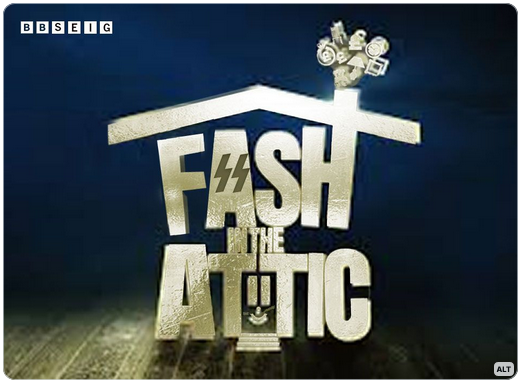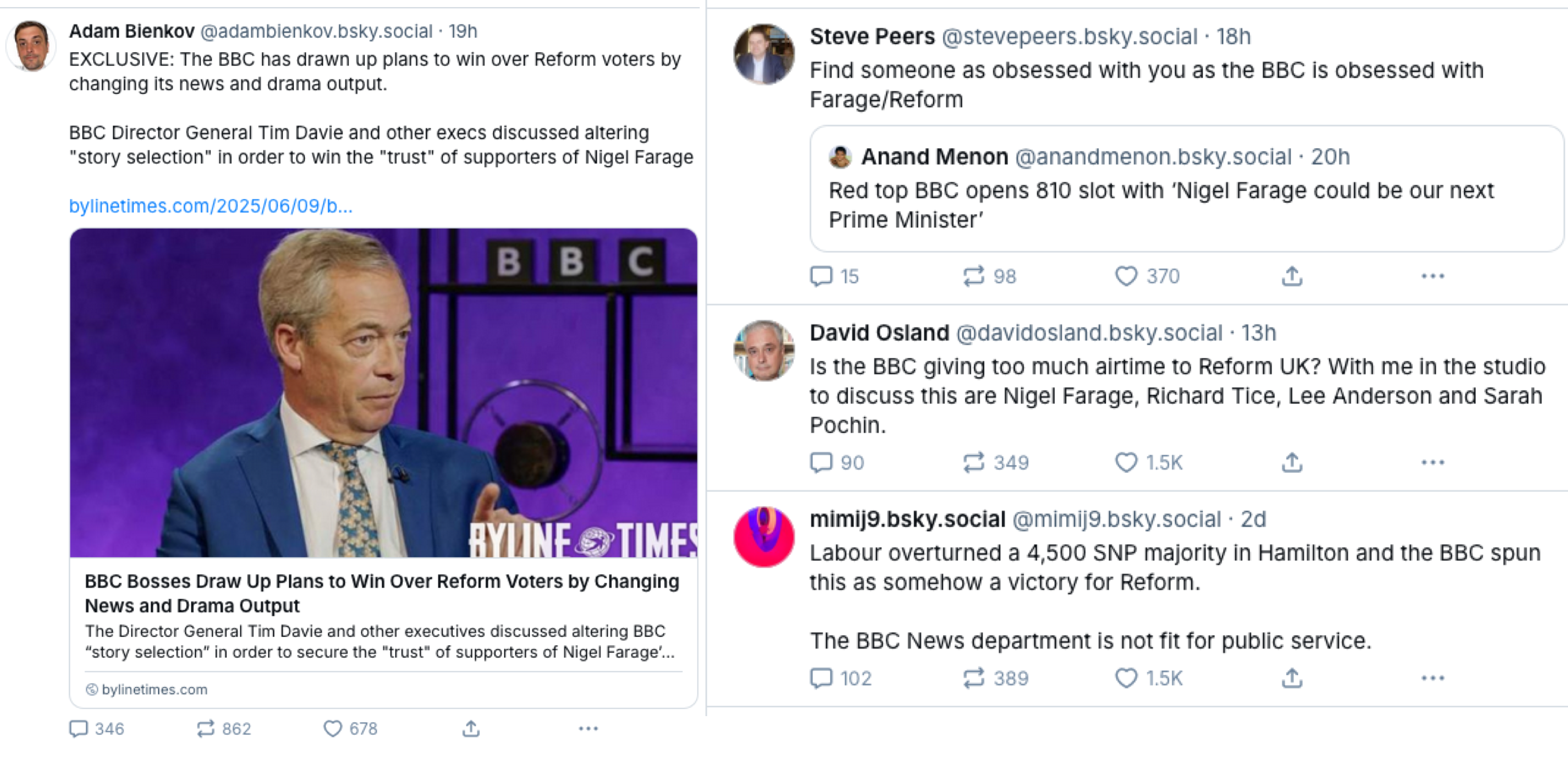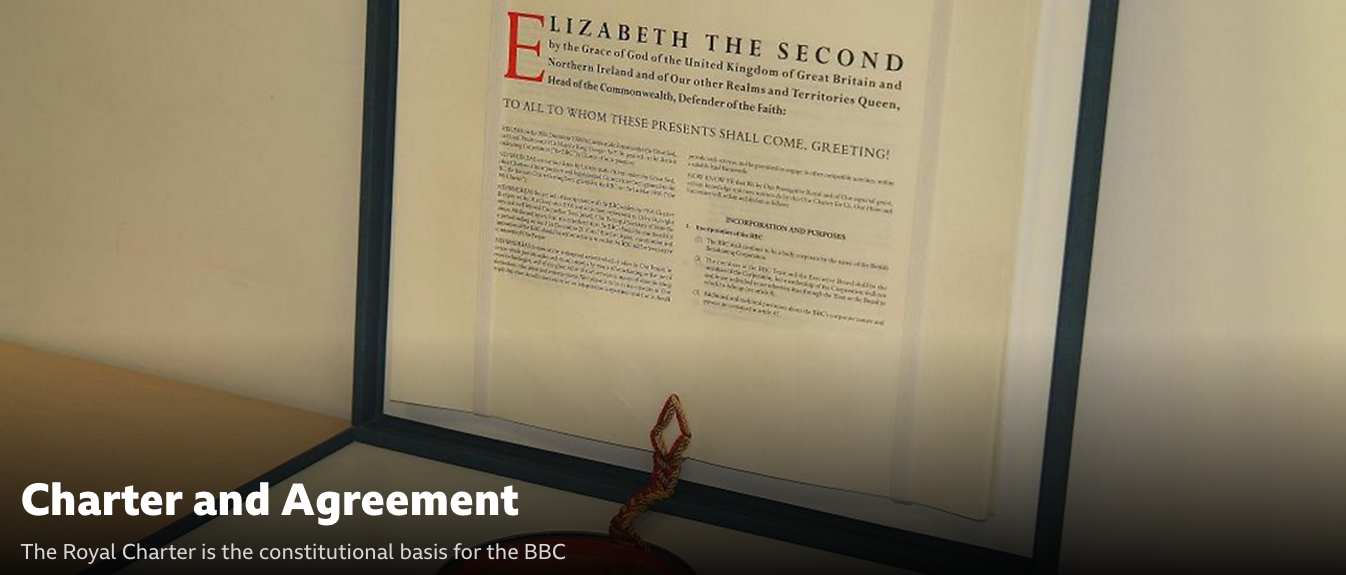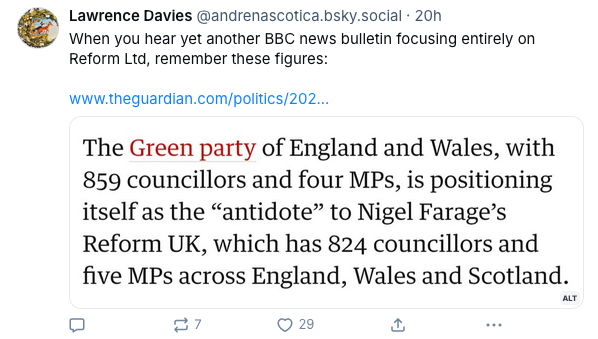We need to talk about the BBC

BBC, Reform UK Ltd and the manufactured crisis of 'balance'
In a democratic society, the principle of political plurality demands that all parties, regardless of size or popularity, are given a fair platform to present their ideas. This ensures that voters are exposed to the full spectrum of political thought, not just the narratives of dominant or media-favoured parties. However, such access must be proportional and responsible; airtime and column inches should reflect electoral support and public interest, not media sensationalism. Otherwise, democracy risks being distorted by artificial prominence, where fringe voices are amplified beyond their mandate while others with genuine representation are silenced.
As of 2024, the political make-up of the House of Commons is as follows:
- Labour: 403 seats (including 43 Labour Co-op MPs): landslide majority
- Conservatives: 120 seats: their worst result ever
- Liberal Democrats: 72 seats
- SNP: 9 seats
- DUP: 5 seats
- Reform UK: 5 seats
- Greens: 4 seats
- Plaid Cymru: 4 seats
- SDLP: 2 Seats
- TUV: 1 Seat
- Speaker: 1 seat
- Independents: 15 seats: mainly left wing with one ex Reform
- Sinn Fein: 7 seats: do not take up their seats

I will say this again: it's 2025, Reform UK Ltd, a fringe party with five MPs - FIVE MPs! - is being treated by the UK media like a legitimate contender for power. Nowhere is this distortion more blatant than on the BBC, where programmes like Question Time and Sunday with Laura Kuenssberg have turned into platforms for far-right normalisation under the guise of public debate. This isn’t about balance. This is bias by design, and it’s dragging our political culture into dangerous territory.
The BBC continues to spotlight the party as if it were a leading force in British politics. It isn’t. But it’s being helped to look like one. Question Time frequently features Reform UK representatives, while elected voices from the Green Party, SNP, or Plaid Cymru are sidelined, despite having more voters behind them. Meanwhile, Kuenssberg’s Sunday programme regularly hosts right-leaning pundits and politicians, often granting them soft interviews that pass as scrutiny. This isn't a mistake. It's a deliberate skewing of the political frame, treating reactionary soundbites as mainstream while locking out the left.
In the UK, the television licence fee is a legally required payment used to fund the British Broadcasting Corporation (BBC). Currently set at £159 per year, this fee ensures that the BBC can operate independently of government or commercial influence. It supports a wide range of services including television and radio channels, as well as digital platforms like BBC iPlayer and BBC Sounds. The licence fee is intended to maintain public service broadcasting, enabling the creation of content that informs, educates, and entertains regardless of profitability or political bias. In return for the licence fee, the BBC is obligated under its Royal Charter to meet high editorial standards, provide impartial news, and offer a broad mix of programming that serves diverse communities across the UK. It must also demonstrate value for money and support media literacy. This funding model underpins the BBC’s role as a trusted, universal public service broadcaster, accountable to the public rather than advertisers or shareholders.

The BBC Charter, formally known as the Royal Charter for the BBC, is the constitutional basis for the BBC. It outlines the broadcaster's public purposes, governance, and responsibilities. Impartiality is one of the BBC’s core editorial standards, and the Charter explicitly emphasises this.
Key Points on Impartiality from the Charter and Framework Agreement:
Public Purpose #1: Provide impartial news and information
- The Charter states that one of the BBC’s fundamental public purposes is to "provide impartial news and information to help people understand and engage with the world around them."
Editorial Standards and Guidelines
- The Charter and accompanying Framework Agreement require the BBC to observe due impartiality in all of its output.
- “Due impartiality” means being fair and balanced, reflecting a breadth of views in a way that is appropriate to the subject and nature of the content.
No Advocacy Role
- The BBC must not act as a campaigning organization or promote a particular point of view on controversial issues.
Oversight by Ofcom
- The Framework Agreement gives Ofcom the role of regulating the BBC’s compliance with editorial standards, including impartiality.
In Practice:
The BBC Editorial Guidelines, which implement the Charter’s requirements, go into more depth. They state:
- Impartiality is not necessarily achieved by simply giving equal time to all views, but by giving appropriate weight to different perspectives.
- The requirement of impartiality applies across news, current affairs, and factual programming.
Over-platforming Reform UK Ltd can therefore be seen as a potential breach of the BBC’s duty of “due impartiality”, depending on the context, timing, and extent of their coverage relative to other political parties. Here's how:
Due Impartiality and Weight
The BBC Charter and Editorial Guidelines require “due impartiality,” which means not necessarily equal time, but appropriate weight based on editorial judgment and context.
- If Reform UK receives disproportionate coverage—especially compared to more established parties with greater democratic representation (e.g., Labour, Conservatives, Lib Dems, Greens)—it could suggest an imbalance.
- The Guidelines warn against giving undue prominence to marginal views or smaller parties unless justified by newsworthiness or public interest.
Editorial Justification Matters
- If the BBC frequently features Reform UK without clear editorial justification—such as news relevance, a surge in polling, or election context—it risks inflating their influence, which may mislead the public and violate impartiality.
- Over-platforming can also distort public perceptions of how much support or legitimacy a party has, which is particularly sensitive during election periods.
Ofcom's Role
- If a breach is suspected, Ofcom may investigate under the Framework Agreement.
- The public and political observers may file complaints if they believe the BBC’s platforming gives Reform UK an unfair advantage or distorts public discourse.
Over-platforming Reform UK would breach the BBC Charter if it undermines due impartiality by giving the party excessive exposure relative to its political relevance, electoral presence, or democratic mandate.

The BBC Charter: supposedly embedding impartiality
So under its Royal Charter, the BBC is bound to impartiality, accuracy, and proportionality. It must represent the UK’s political diversity, especially during times of political importance. That doesn’t mean equal time for every voice, it means fair and representative coverage based on electoral strength and public support. What we’re seeing in 2025 is a flagrant breach of that principle. Reform UK Ltd, a minor party with major media amplification, is being allowed to dominate coverage beyond any proportion to its democratic base. This isn’t just unfair, it’s dangerous. Because every time Reform UK Ltd's anti-immigrant, anti-climate, anti-worker messaging is treated like a credible 'alternative', it pulls the centre of political gravity rightward and narrows the public’s sense of what’s possible or acceptable.
It's almost as if the media establishment wants the political chaos a Reform UK Ltd government would bring. After all, when the news cycle thrives on controversy, populism sells. The more extreme the rhetoric, the higher the clicks, and the greater the distraction from real issues like climate collapse, NHS underfunding, or housing injustice. What would a Reform UK government actually look like? A bonfire of workers’ rights, turbocharged deregulation, a rollback of climate action, and a culture war waged from Westminster. It would be a wrecking ball for working people, and the BBC seems willing to give it airtime, endlessly, without scrutiny, without context, and without asking why this party with a very limited electoral mandate deserves it.

It's telling that the Greens, with an identical power base in both Parliament and local government don't get a fraction of the coverage Reform does.
We have to call this what it is: state-funded complicity in the normalisation of far-right politics. The BBC’s failures aren't just editorial, they're political. Every time they choose to host Reform UK Ltd over parties with actual democratic legitimacy, they are failing the public, breaching the Charter, and distorting our democracy. It’s time for real accountability. That means:
- Demanding a public audit of how and why Reform UK is featured.
- Enforcing proportional panel representation based on electoral outcomes, not media fascination.
- Pressuring Ofcom to investigate potential Charter breaches.
- Reclaiming our public broadcaster for the people who actually fund it.
The BBC doesn’t belong to Farage. It doesn't belong to Richard Tice. It doesn’t belong to Reform UK Ltd. It belongs to us. And if we don’t fight for it, we’ll lose it: to those who don’t want a fairer society, but a broken one they can dominate.
And, one final point to the BBC, appeasement never works with fascists. They see it a weakness, an open door they can push against. The way to shut down fascists is not to reach out to them but to deny them the oxygen of publicity. In the case of the BBC, you should be giving them no more or less publicity than you give to the Green Party. That would be commensurate to the aims of your Charter.
The world has gone mad. If you enjoyed reading this, please feel free to look at the rest of the blogs on www.TetleysTLDR.com. They're free to view, there's no paywall, they aren't monetised and I won't ask you to buy me a coffee. Also please free to share anything you find of interest, we only get the message out if people are aware of it. Just a leftie, standing in front of another leftie, asking to be read. All the best, Tetley

